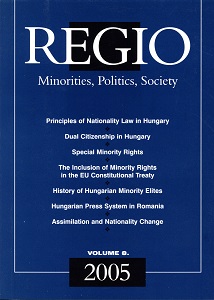Special minority rights and interpretations of the nation in the Hungarian Constitution
Special minority rights and interpretations of the nation in the Hungarian Constitution
Author(s): Balázs MajtényiSubject(s): Law, Constitution, Jurisprudence
Published by: MTA Társadalomtudományi Kutatóközpont Kisebbsegkutató Intézet
Keywords: minority rights; Hungary; nation
Summary/Abstract: The question of special minority rights arises in the Hungarian Constitution not only on the level of fundamental right but also on that of state organization. In order to interpret the latter and, simultaneously on minority rights, it is worth examining the concepts of nation the Constitution utilizes and the meanings it attaches to the appellation of ‘people’ and ‘nation’. The most important question that arises in the course of legal interpretation is which of the two definitions of nation or which possible combined use of them can be made to coincide with one of the basic principles of modern democracies: the moral equality of all members of the political community. If the state cannot be neutral it must formulate the concept of political nation in reference to every member of the political community. These, having taken into account the moral equality of each member of the political community and in the interest of ensuring the power and prestige of the state. Thus, the state may take the first step away from much-revered but presently unattainable neutrality as regards each member of the political community only if it creates a political concept of nation that can pertain to each citizen.
Journal: Regio - Minorities, Politics, Society - English Edition
- Issue Year: VIII/2005
- Issue No: 1
- Page Range: 4-20
- Page Count: 17
- Language: English

